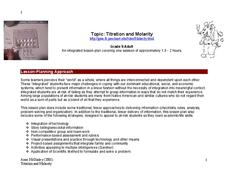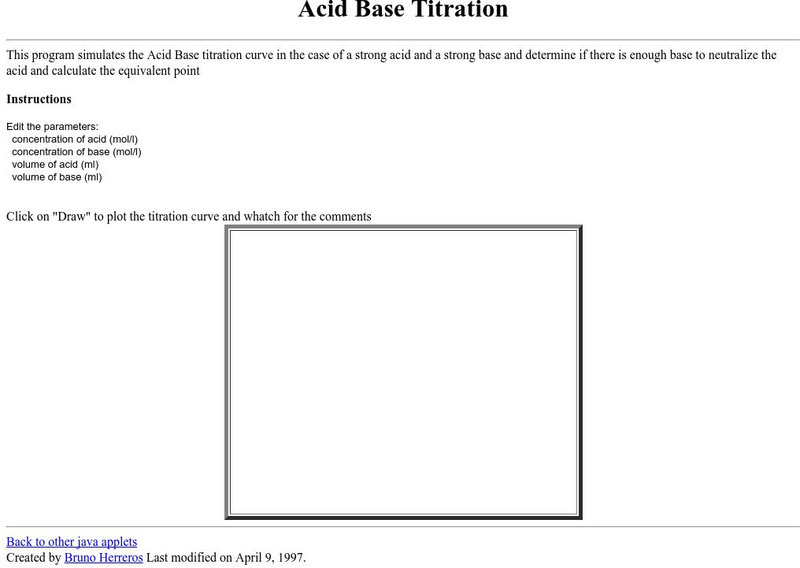Curated OER
Reactions in Aqueous Solutions
In this solutions worksheet, students calculate the molarity and solubility for given reactions. Students work on dilution, precipitation, and titration reactions. This worksheet has 15 problems to solve.
Curated OER
WS 10.8 Acid-Base Neutralization and Titration
In this acid and base instructional activity, students write balanced equations for neutralization reactions, they calculate volumes of acids and bases needed to titrate solutions and they determine molarities of solutions.
Curated OER
Pre-Lab Questions-Acids and Bases
For this acids and bases worksheet, students answer eight questions about acids and bases prior to doing a titration lab. They define both acids and bases and explain what a neutralization reaction is as well as a titration.
Curated OER
Acids and Bases Worksheet
In this acid and base worksheet, students solve three problems. They calculate pH and equilibrium concentrations, they determine what is needed to prepare a proper buffer solution and they answer questions about a titration.
Curated OER
Acids and Bases
In this acid and base learning exercise, students calculate the pH of solutions, sketch a titration curve, write equations used to determine the pH of solutions and determine the location on a titration curve of a given molar solution.
Curated OER
Equilibrium Practice Problems
In this equilibrium worksheet, students answer thirty multiple choice problems including topics such as pH, analyzing titration curves, calculating molar concentrations and working with equilibrium constants.
Curated OER
Ranking Salinity
Students explain the uses of titration in chemistry and in industry. In this chemistry lesson, students determine the concentration of an unknown solution using titration. They calculate the percent of salt in saline solutions.
Curated OER
Precipitation and Neutralization Reactions
In this chemical reactions worksheet, students determine the balanced formula equation, balanced complete ionic equation, and the balanced net ionic equation for given reactions. Students calculate final concentrations for ions in given...
Curated OER
Where in the World is Carbon Dixoide?
Students conduct experiments designed to detect the presence of CO2 by using a BTB that changes color (blue to yellow) in the presence of CO2. First, students experiment with the CO2 from combining vinegar and baking soda. In part two,...
Curated OER
Titration and Molarity
Students investigate the concept of molarity and its relationship to the concentration of a solution. After mixing chemical solutions, they calculate how many moles of acid and base should be in each solution. They record their results...
Curated OER
Titration and Molarity
Students are introduced to the concepts of molarity and titration. As a class, they develop a list of the correct steps they need to follow to create a specific concentration of a solution. They design and complete an experiment in...
Curated OER
Acidity of Soda Pop
Pupils conduct an experiment to determine the acidity of three different brands of soda by adding a known volume of base until a pink color appears in the reaction vessel. They test fresh and flat soda, observe any differences, and draw...
Curated OER
Vision Props of Signed Numbers
Students explore the concept of titration. In this titration lesson, students observe acid and alkaline reacting. Students discuss pH factor, measuring acidity, neutrality, and alkalinity of liquids. Students put the pH of liquids on a...
Curated OER
Determination of the percentage of Acetic Acid in Vinegar
Young scholars determine the concentration of acetic acid when the concentration of the base with which is titrated is known. They investigate how to weigh a sample using the balance, measure volumes using graduated cylinder, explore...
City University of New York
P H and Indicators: Interactive Investigation
The story of the dye industry is used to introduce pH and how it is measured and calculated.
University of Southern California
Usc Chemistry: Acid Base Titration
This java site allows students to enter the concentration and volume of the base and acid and see the titration curve that is produced.
Science Education Resource Center at Carleton College
Serc: Investigating Acids and Bases: Strong vs Weak
In this chemistry lab activity, students will study acids/bases before learning how titration data is used to determine an unknown concentration. It is an investigation of the pH curve and an assessment of student's understanding of...
Dartmouth College
Dartmouth College: Buret
This informative site defines what a buret is and how it is used when doing a titration. Excellent pictures of the buret and the titration process.
Dartmouth College
Dartmouth College: Chem Lab: Coordination Chemistry 1: Synthesis
In this four-week experiment, you will synthesize a compound and purify it in week 1. In week 2, you will assay it for purity by colorimetric analysis and by gravimetric analysis. In week 3, you will analyze your compound by titration of...
Dartmouth College
Dartmouth College: Chem Lab: Coordination Chemistry 3.1: Acid/base Analysis
In this experiment, you will examine the acidity of your coordination complex's water ligand. You will determine the acid dissociation constant of the complex by titrating it with a base. There are eight weeks of experiments in this series.
Carnegie Mellon University
Chem Collective: Stoichiometry Bridge Course
This is a complete course in chemical stoichiometry, set in a scenario that shows how stoichiometry calculations are used in real-world situations. This course has been designed to not only help you strengthen your skills with...
Wyzant
Wyzant: Acids and Bases
This site presents everything you need to know about acids and bases and more! Gives a nice description on what acids and bases are, properties of both, strong and weak acids and bases, an overview of pH, and much more.
Chemistry Collective
Chem Collective: Determine the Concentration of the Unknown Strong Acid
Perform a titration using an indicator to determine the concentration of an HCl solution.
Chemistry Collective
Chem Collective: Determining the Concentration of an Unknown Solution
Using the Virtual Laboratory design, students perform an experiment to determine the concentration of the unknown HCl solution to four significant figures.























